Entrepreneurship and Small Business Management Report - Nelson College
VerifiedAdded on 2023/01/11
|12
|2751
|25
Report
AI Summary
This report delves into the realm of entrepreneurship and small business management, examining different types of entrepreneurial ventures, including small businesses, large companies, scalable startups, and social enterprises, and their typologies. It explores the similarities and differences between these ventures and assesses the impact of micro and small businesses on the UK economy, supported by relevant data and statistics. Furthermore, the report highlights the importance of small businesses and startups in fostering the growth of the social economy, emphasizing their contribution to employment and financial independence. It also identifies the characteristic traits and skills of successful entrepreneurs, differentiating them from other business managers, and assesses how entrepreneurial personalities reflect motivation and mindset. Finally, the report examines how background and experience can either hinder or foster entrepreneurial endeavors, using examples such as Mark Zuckerberg and Bill Gates to illustrate these points. The report concludes with a comprehensive overview of the key findings and their implications for the field of entrepreneurship.

Entrepreneurship and Small Business
Management
Management
Paraphrase This Document
Need a fresh take? Get an instant paraphrase of this document with our AI Paraphraser
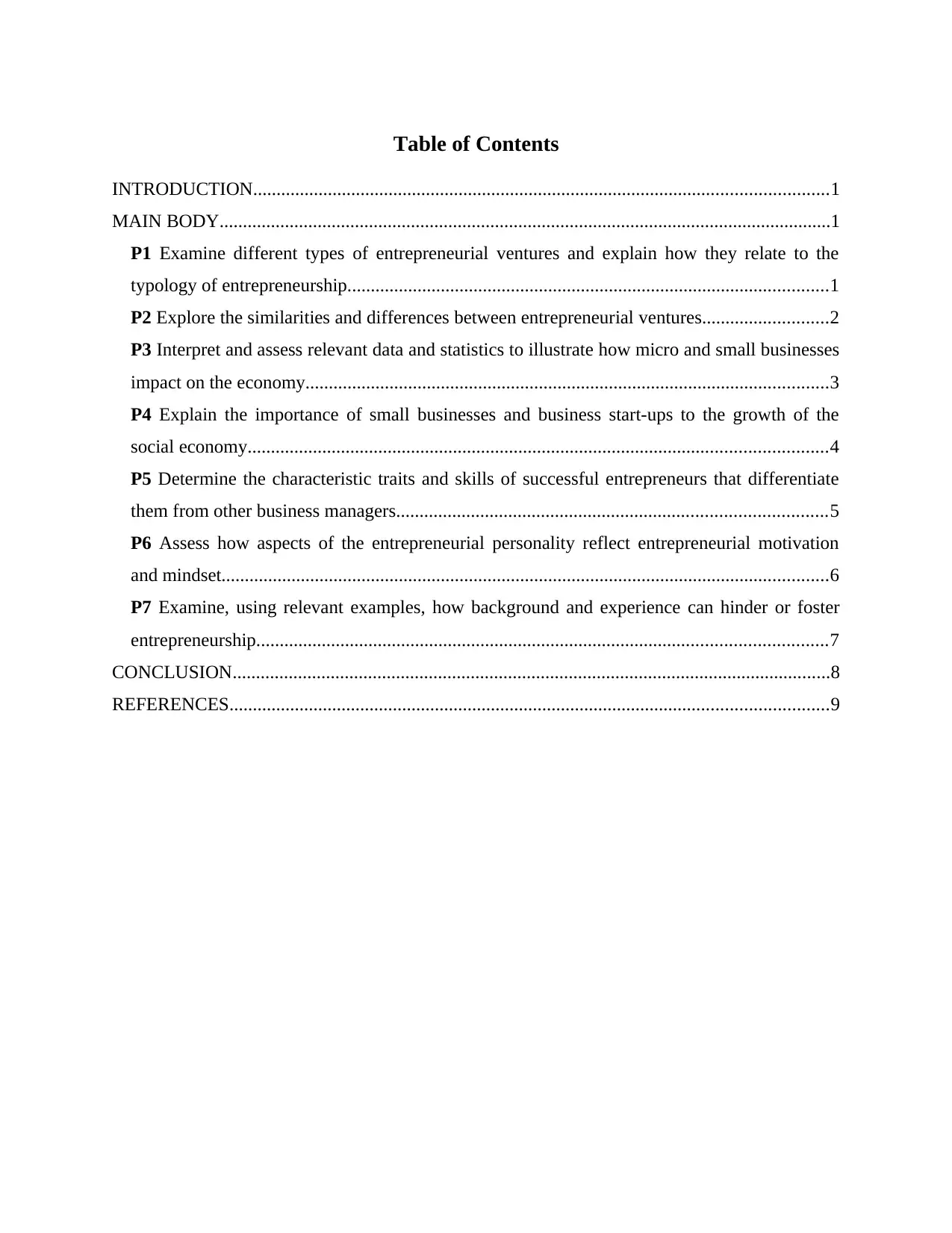
Table of Contents
INTRODUCTION...........................................................................................................................1
MAIN BODY...................................................................................................................................1
P1 Examine different types of entrepreneurial ventures and explain how they relate to the
typology of entrepreneurship.......................................................................................................1
P2 Explore the similarities and differences between entrepreneurial ventures...........................2
P3 Interpret and assess relevant data and statistics to illustrate how micro and small businesses
impact on the economy................................................................................................................3
P4 Explain the importance of small businesses and business start-ups to the growth of the
social economy............................................................................................................................4
P5 Determine the characteristic traits and skills of successful entrepreneurs that differentiate
them from other business managers............................................................................................5
P6 Assess how aspects of the entrepreneurial personality reflect entrepreneurial motivation
and mindset..................................................................................................................................6
P7 Examine, using relevant examples, how background and experience can hinder or foster
entrepreneurship..........................................................................................................................7
CONCLUSION................................................................................................................................8
REFERENCES................................................................................................................................9
INTRODUCTION...........................................................................................................................1
MAIN BODY...................................................................................................................................1
P1 Examine different types of entrepreneurial ventures and explain how they relate to the
typology of entrepreneurship.......................................................................................................1
P2 Explore the similarities and differences between entrepreneurial ventures...........................2
P3 Interpret and assess relevant data and statistics to illustrate how micro and small businesses
impact on the economy................................................................................................................3
P4 Explain the importance of small businesses and business start-ups to the growth of the
social economy............................................................................................................................4
P5 Determine the characteristic traits and skills of successful entrepreneurs that differentiate
them from other business managers............................................................................................5
P6 Assess how aspects of the entrepreneurial personality reflect entrepreneurial motivation
and mindset..................................................................................................................................6
P7 Examine, using relevant examples, how background and experience can hinder or foster
entrepreneurship..........................................................................................................................7
CONCLUSION................................................................................................................................8
REFERENCES................................................................................................................................9

⊘ This is a preview!⊘
Do you want full access?
Subscribe today to unlock all pages.

Trusted by 1+ million students worldwide
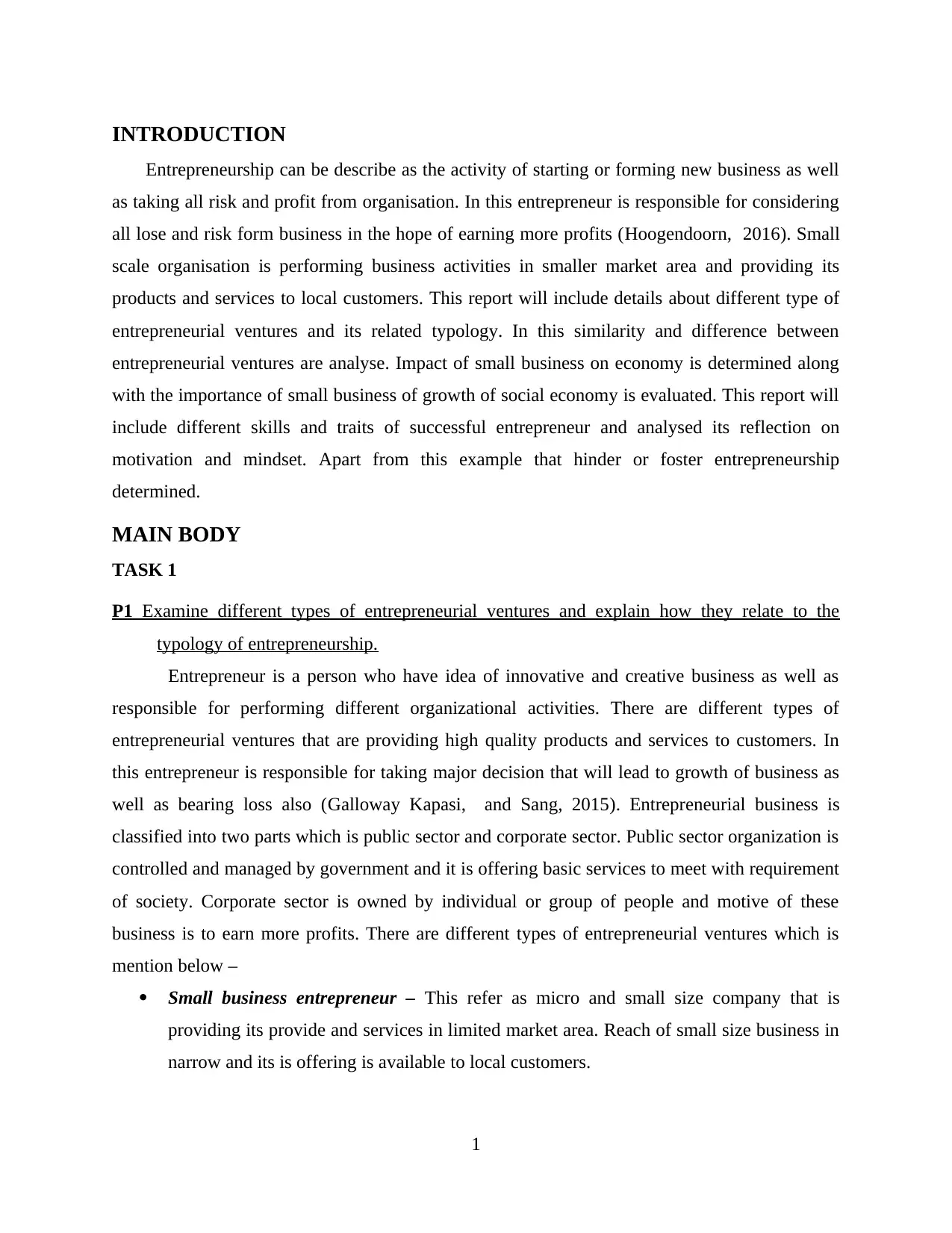
INTRODUCTION
Entrepreneurship can be describe as the activity of starting or forming new business as well
as taking all risk and profit from organisation. In this entrepreneur is responsible for considering
all lose and risk form business in the hope of earning more profits (Hoogendoorn, 2016). Small
scale organisation is performing business activities in smaller market area and providing its
products and services to local customers. This report will include details about different type of
entrepreneurial ventures and its related typology. In this similarity and difference between
entrepreneurial ventures are analyse. Impact of small business on economy is determined along
with the importance of small business of growth of social economy is evaluated. This report will
include different skills and traits of successful entrepreneur and analysed its reflection on
motivation and mindset. Apart from this example that hinder or foster entrepreneurship
determined.
MAIN BODY
TASK 1
P1 Examine different types of entrepreneurial ventures and explain how they relate to the
typology of entrepreneurship.
Entrepreneur is a person who have idea of innovative and creative business as well as
responsible for performing different organizational activities. There are different types of
entrepreneurial ventures that are providing high quality products and services to customers. In
this entrepreneur is responsible for taking major decision that will lead to growth of business as
well as bearing loss also (Galloway Kapasi, and Sang, 2015). Entrepreneurial business is
classified into two parts which is public sector and corporate sector. Public sector organization is
controlled and managed by government and it is offering basic services to meet with requirement
of society. Corporate sector is owned by individual or group of people and motive of these
business is to earn more profits. There are different types of entrepreneurial ventures which is
mention below –
Small business entrepreneur – This refer as micro and small size company that is
providing its provide and services in limited market area. Reach of small size business in
narrow and its is offering is available to local customers.
1
Entrepreneurship can be describe as the activity of starting or forming new business as well
as taking all risk and profit from organisation. In this entrepreneur is responsible for considering
all lose and risk form business in the hope of earning more profits (Hoogendoorn, 2016). Small
scale organisation is performing business activities in smaller market area and providing its
products and services to local customers. This report will include details about different type of
entrepreneurial ventures and its related typology. In this similarity and difference between
entrepreneurial ventures are analyse. Impact of small business on economy is determined along
with the importance of small business of growth of social economy is evaluated. This report will
include different skills and traits of successful entrepreneur and analysed its reflection on
motivation and mindset. Apart from this example that hinder or foster entrepreneurship
determined.
MAIN BODY
TASK 1
P1 Examine different types of entrepreneurial ventures and explain how they relate to the
typology of entrepreneurship.
Entrepreneur is a person who have idea of innovative and creative business as well as
responsible for performing different organizational activities. There are different types of
entrepreneurial ventures that are providing high quality products and services to customers. In
this entrepreneur is responsible for taking major decision that will lead to growth of business as
well as bearing loss also (Galloway Kapasi, and Sang, 2015). Entrepreneurial business is
classified into two parts which is public sector and corporate sector. Public sector organization is
controlled and managed by government and it is offering basic services to meet with requirement
of society. Corporate sector is owned by individual or group of people and motive of these
business is to earn more profits. There are different types of entrepreneurial ventures which is
mention below –
Small business entrepreneur – This refer as micro and small size company that is
providing its provide and services in limited market area. Reach of small size business in
narrow and its is offering is available to local customers.
1
Paraphrase This Document
Need a fresh take? Get an instant paraphrase of this document with our AI Paraphraser
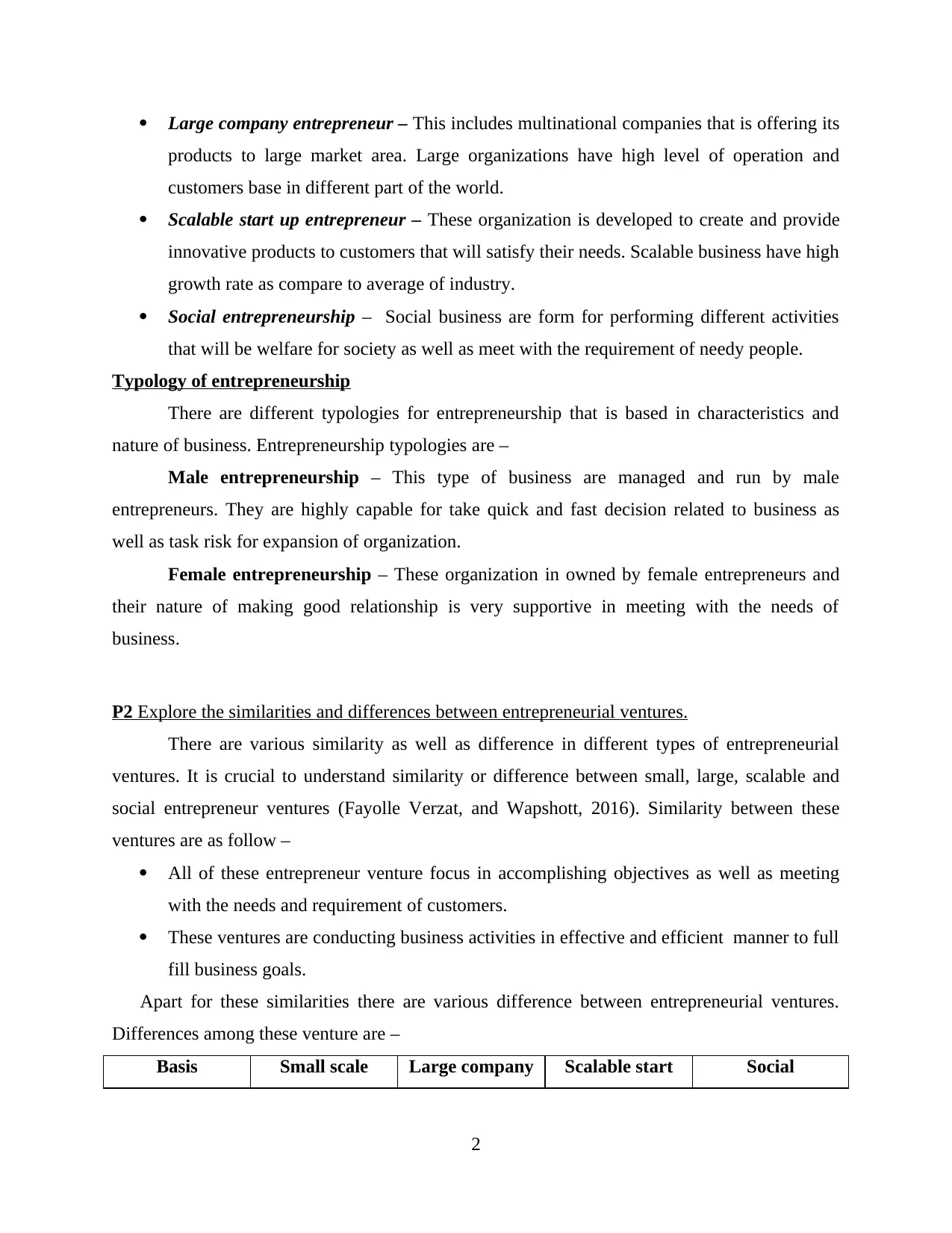
Large company entrepreneur – This includes multinational companies that is offering its
products to large market area. Large organizations have high level of operation and
customers base in different part of the world.
Scalable start up entrepreneur – These organization is developed to create and provide
innovative products to customers that will satisfy their needs. Scalable business have high
growth rate as compare to average of industry.
Social entrepreneurship – Social business are form for performing different activities
that will be welfare for society as well as meet with the requirement of needy people.
Typology of entrepreneurship
There are different typologies for entrepreneurship that is based in characteristics and
nature of business. Entrepreneurship typologies are –
Male entrepreneurship – This type of business are managed and run by male
entrepreneurs. They are highly capable for take quick and fast decision related to business as
well as task risk for expansion of organization.
Female entrepreneurship – These organization in owned by female entrepreneurs and
their nature of making good relationship is very supportive in meeting with the needs of
business.
P2 Explore the similarities and differences between entrepreneurial ventures.
There are various similarity as well as difference in different types of entrepreneurial
ventures. It is crucial to understand similarity or difference between small, large, scalable and
social entrepreneur ventures (Fayolle Verzat, and Wapshott, 2016). Similarity between these
ventures are as follow –
All of these entrepreneur venture focus in accomplishing objectives as well as meeting
with the needs and requirement of customers.
These ventures are conducting business activities in effective and efficient manner to full
fill business goals.
Apart for these similarities there are various difference between entrepreneurial ventures.
Differences among these venture are –
Basis Small scale Large company Scalable start Social
2
products to large market area. Large organizations have high level of operation and
customers base in different part of the world.
Scalable start up entrepreneur – These organization is developed to create and provide
innovative products to customers that will satisfy their needs. Scalable business have high
growth rate as compare to average of industry.
Social entrepreneurship – Social business are form for performing different activities
that will be welfare for society as well as meet with the requirement of needy people.
Typology of entrepreneurship
There are different typologies for entrepreneurship that is based in characteristics and
nature of business. Entrepreneurship typologies are –
Male entrepreneurship – This type of business are managed and run by male
entrepreneurs. They are highly capable for take quick and fast decision related to business as
well as task risk for expansion of organization.
Female entrepreneurship – These organization in owned by female entrepreneurs and
their nature of making good relationship is very supportive in meeting with the needs of
business.
P2 Explore the similarities and differences between entrepreneurial ventures.
There are various similarity as well as difference in different types of entrepreneurial
ventures. It is crucial to understand similarity or difference between small, large, scalable and
social entrepreneur ventures (Fayolle Verzat, and Wapshott, 2016). Similarity between these
ventures are as follow –
All of these entrepreneur venture focus in accomplishing objectives as well as meeting
with the needs and requirement of customers.
These ventures are conducting business activities in effective and efficient manner to full
fill business goals.
Apart for these similarities there are various difference between entrepreneurial ventures.
Differences among these venture are –
Basis Small scale Large company Scalable start Social
2
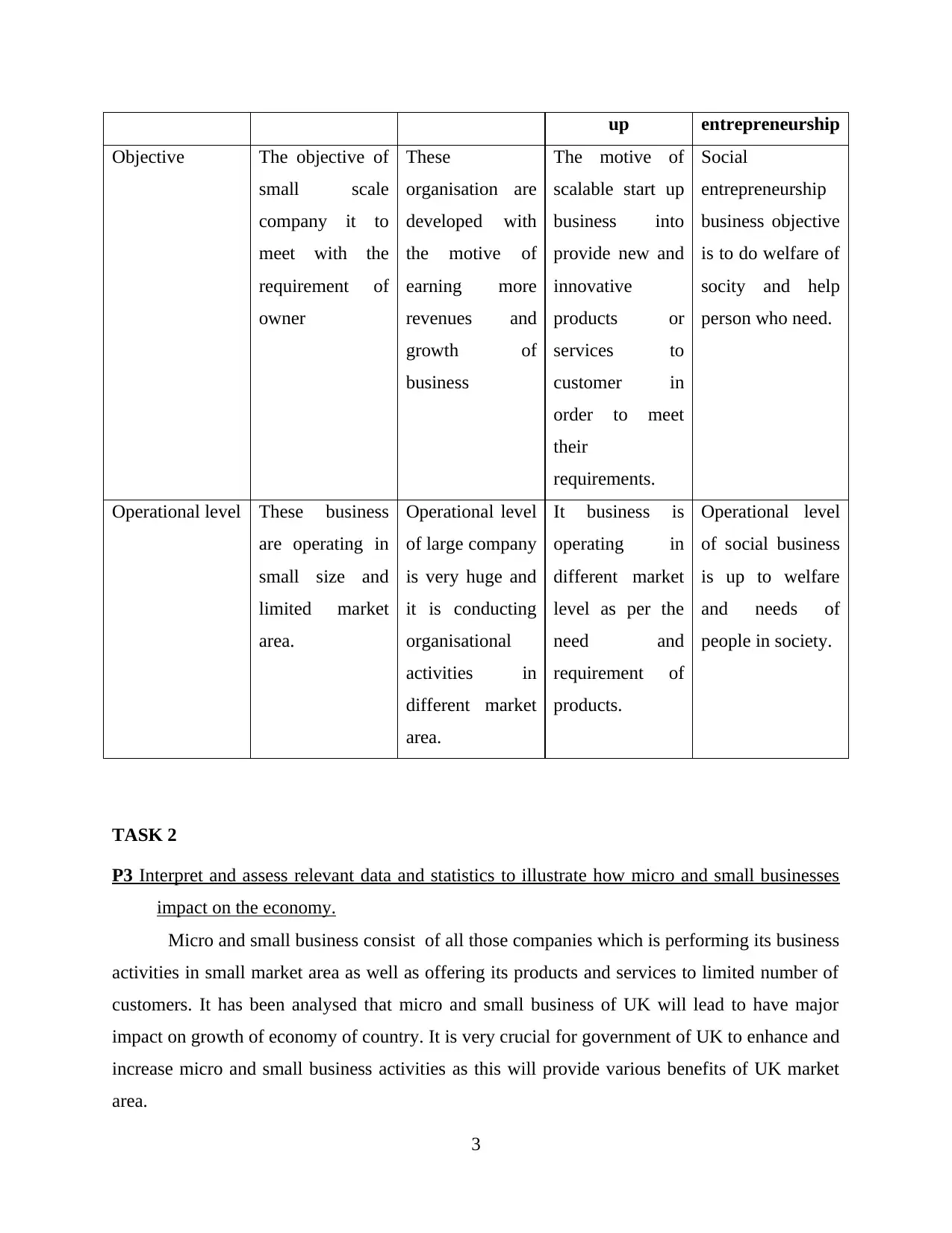
up entrepreneurship
Objective The objective of
small scale
company it to
meet with the
requirement of
owner
These
organisation are
developed with
the motive of
earning more
revenues and
growth of
business
The motive of
scalable start up
business into
provide new and
innovative
products or
services to
customer in
order to meet
their
requirements.
Social
entrepreneurship
business objective
is to do welfare of
socity and help
person who need.
Operational level These business
are operating in
small size and
limited market
area.
Operational level
of large company
is very huge and
it is conducting
organisational
activities in
different market
area.
It business is
operating in
different market
level as per the
need and
requirement of
products.
Operational level
of social business
is up to welfare
and needs of
people in society.
TASK 2
P3 Interpret and assess relevant data and statistics to illustrate how micro and small businesses
impact on the economy.
Micro and small business consist of all those companies which is performing its business
activities in small market area as well as offering its products and services to limited number of
customers. It has been analysed that micro and small business of UK will lead to have major
impact on growth of economy of country. It is very crucial for government of UK to enhance and
increase micro and small business activities as this will provide various benefits of UK market
area.
3
Objective The objective of
small scale
company it to
meet with the
requirement of
owner
These
organisation are
developed with
the motive of
earning more
revenues and
growth of
business
The motive of
scalable start up
business into
provide new and
innovative
products or
services to
customer in
order to meet
their
requirements.
Social
entrepreneurship
business objective
is to do welfare of
socity and help
person who need.
Operational level These business
are operating in
small size and
limited market
area.
Operational level
of large company
is very huge and
it is conducting
organisational
activities in
different market
area.
It business is
operating in
different market
level as per the
need and
requirement of
products.
Operational level
of social business
is up to welfare
and needs of
people in society.
TASK 2
P3 Interpret and assess relevant data and statistics to illustrate how micro and small businesses
impact on the economy.
Micro and small business consist of all those companies which is performing its business
activities in small market area as well as offering its products and services to limited number of
customers. It has been analysed that micro and small business of UK will lead to have major
impact on growth of economy of country. It is very crucial for government of UK to enhance and
increase micro and small business activities as this will provide various benefits of UK market
area.
3
⊘ This is a preview!⊘
Do you want full access?
Subscribe today to unlock all pages.

Trusted by 1+ million students worldwide
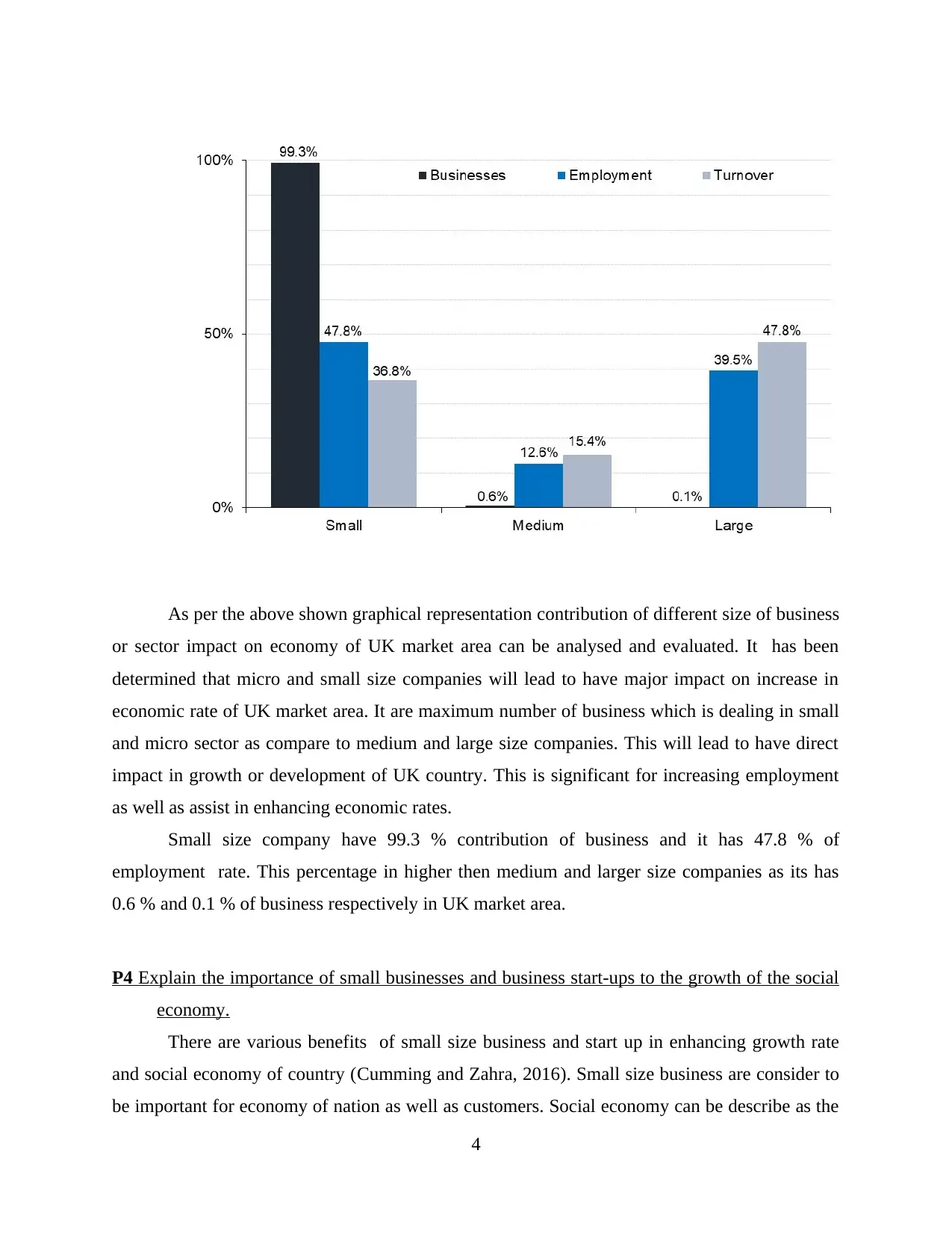
As per the above shown graphical representation contribution of different size of business
or sector impact on economy of UK market area can be analysed and evaluated. It has been
determined that micro and small size companies will lead to have major impact on increase in
economic rate of UK market area. It are maximum number of business which is dealing in small
and micro sector as compare to medium and large size companies. This will lead to have direct
impact in growth or development of UK country. This is significant for increasing employment
as well as assist in enhancing economic rates.
Small size company have 99.3 % contribution of business and it has 47.8 % of
employment rate. This percentage in higher then medium and larger size companies as its has
0.6 % and 0.1 % of business respectively in UK market area.
P4 Explain the importance of small businesses and business start-ups to the growth of the social
economy.
There are various benefits of small size business and start up in enhancing growth rate
and social economy of country (Cumming and Zahra, 2016). Small size business are consider to
be important for economy of nation as well as customers. Social economy can be describe as the
4
or sector impact on economy of UK market area can be analysed and evaluated. It has been
determined that micro and small size companies will lead to have major impact on increase in
economic rate of UK market area. It are maximum number of business which is dealing in small
and micro sector as compare to medium and large size companies. This will lead to have direct
impact in growth or development of UK country. This is significant for increasing employment
as well as assist in enhancing economic rates.
Small size company have 99.3 % contribution of business and it has 47.8 % of
employment rate. This percentage in higher then medium and larger size companies as its has
0.6 % and 0.1 % of business respectively in UK market area.
P4 Explain the importance of small businesses and business start-ups to the growth of the social
economy.
There are various benefits of small size business and start up in enhancing growth rate
and social economy of country (Cumming and Zahra, 2016). Small size business are consider to
be important for economy of nation as well as customers. Social economy can be describe as the
4
Paraphrase This Document
Need a fresh take? Get an instant paraphrase of this document with our AI Paraphraser
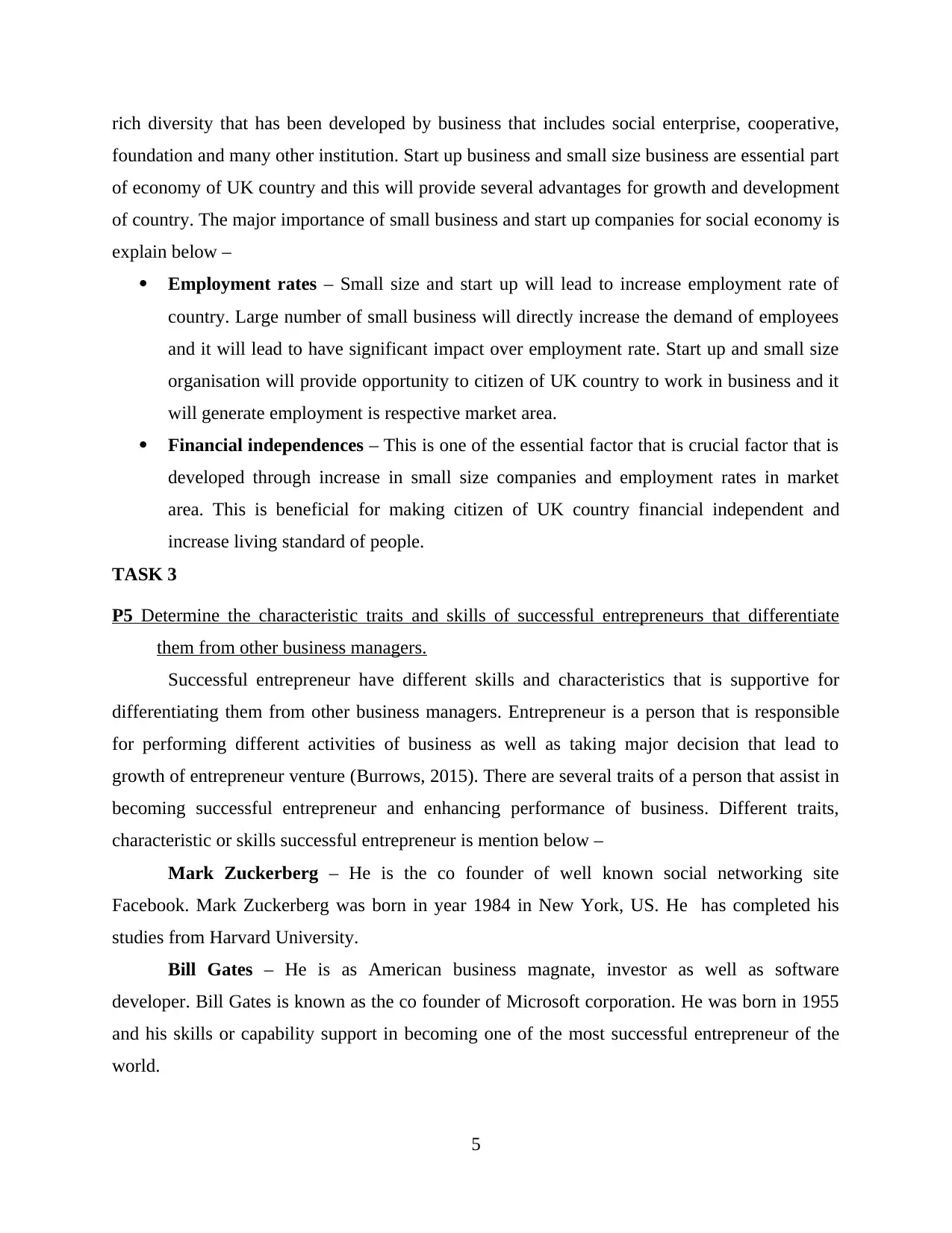
rich diversity that has been developed by business that includes social enterprise, cooperative,
foundation and many other institution. Start up business and small size business are essential part
of economy of UK country and this will provide several advantages for growth and development
of country. The major importance of small business and start up companies for social economy is
explain below –
Employment rates – Small size and start up will lead to increase employment rate of
country. Large number of small business will directly increase the demand of employees
and it will lead to have significant impact over employment rate. Start up and small size
organisation will provide opportunity to citizen of UK country to work in business and it
will generate employment is respective market area.
Financial independences – This is one of the essential factor that is crucial factor that is
developed through increase in small size companies and employment rates in market
area. This is beneficial for making citizen of UK country financial independent and
increase living standard of people.
TASK 3
P5 Determine the characteristic traits and skills of successful entrepreneurs that differentiate
them from other business managers.
Successful entrepreneur have different skills and characteristics that is supportive for
differentiating them from other business managers. Entrepreneur is a person that is responsible
for performing different activities of business as well as taking major decision that lead to
growth of entrepreneur venture (Burrows, 2015). There are several traits of a person that assist in
becoming successful entrepreneur and enhancing performance of business. Different traits,
characteristic or skills successful entrepreneur is mention below –
Mark Zuckerberg – He is the co founder of well known social networking site
Facebook. Mark Zuckerberg was born in year 1984 in New York, US. He has completed his
studies from Harvard University.
Bill Gates – He is as American business magnate, investor as well as software
developer. Bill Gates is known as the co founder of Microsoft corporation. He was born in 1955
and his skills or capability support in becoming one of the most successful entrepreneur of the
world.
5
foundation and many other institution. Start up business and small size business are essential part
of economy of UK country and this will provide several advantages for growth and development
of country. The major importance of small business and start up companies for social economy is
explain below –
Employment rates – Small size and start up will lead to increase employment rate of
country. Large number of small business will directly increase the demand of employees
and it will lead to have significant impact over employment rate. Start up and small size
organisation will provide opportunity to citizen of UK country to work in business and it
will generate employment is respective market area.
Financial independences – This is one of the essential factor that is crucial factor that is
developed through increase in small size companies and employment rates in market
area. This is beneficial for making citizen of UK country financial independent and
increase living standard of people.
TASK 3
P5 Determine the characteristic traits and skills of successful entrepreneurs that differentiate
them from other business managers.
Successful entrepreneur have different skills and characteristics that is supportive for
differentiating them from other business managers. Entrepreneur is a person that is responsible
for performing different activities of business as well as taking major decision that lead to
growth of entrepreneur venture (Burrows, 2015). There are several traits of a person that assist in
becoming successful entrepreneur and enhancing performance of business. Different traits,
characteristic or skills successful entrepreneur is mention below –
Mark Zuckerberg – He is the co founder of well known social networking site
Facebook. Mark Zuckerberg was born in year 1984 in New York, US. He has completed his
studies from Harvard University.
Bill Gates – He is as American business magnate, investor as well as software
developer. Bill Gates is known as the co founder of Microsoft corporation. He was born in 1955
and his skills or capability support in becoming one of the most successful entrepreneur of the
world.
5
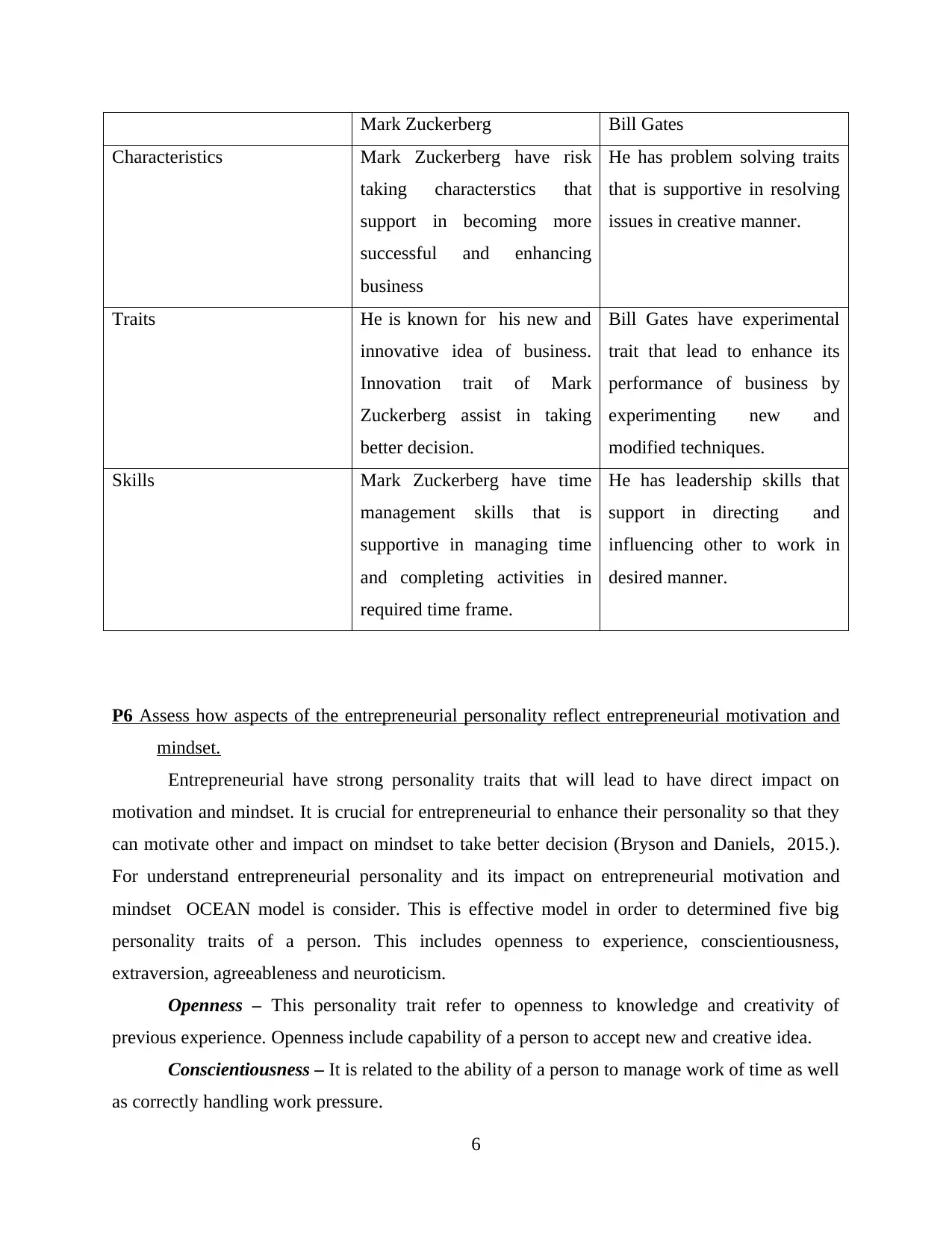
Mark Zuckerberg Bill Gates
Characteristics Mark Zuckerberg have risk
taking characterstics that
support in becoming more
successful and enhancing
business
He has problem solving traits
that is supportive in resolving
issues in creative manner.
Traits He is known for his new and
innovative idea of business.
Innovation trait of Mark
Zuckerberg assist in taking
better decision.
Bill Gates have experimental
trait that lead to enhance its
performance of business by
experimenting new and
modified techniques.
Skills Mark Zuckerberg have time
management skills that is
supportive in managing time
and completing activities in
required time frame.
He has leadership skills that
support in directing and
influencing other to work in
desired manner.
P6 Assess how aspects of the entrepreneurial personality reflect entrepreneurial motivation and
mindset.
Entrepreneurial have strong personality traits that will lead to have direct impact on
motivation and mindset. It is crucial for entrepreneurial to enhance their personality so that they
can motivate other and impact on mindset to take better decision (Bryson and Daniels, 2015.).
For understand entrepreneurial personality and its impact on entrepreneurial motivation and
mindset OCEAN model is consider. This is effective model in order to determined five big
personality traits of a person. This includes openness to experience, conscientiousness,
extraversion, agreeableness and neuroticism.
Openness – This personality trait refer to openness to knowledge and creativity of
previous experience. Openness include capability of a person to accept new and creative idea.
Conscientiousness – It is related to the ability of a person to manage work of time as well
as correctly handling work pressure.
6
Characteristics Mark Zuckerberg have risk
taking characterstics that
support in becoming more
successful and enhancing
business
He has problem solving traits
that is supportive in resolving
issues in creative manner.
Traits He is known for his new and
innovative idea of business.
Innovation trait of Mark
Zuckerberg assist in taking
better decision.
Bill Gates have experimental
trait that lead to enhance its
performance of business by
experimenting new and
modified techniques.
Skills Mark Zuckerberg have time
management skills that is
supportive in managing time
and completing activities in
required time frame.
He has leadership skills that
support in directing and
influencing other to work in
desired manner.
P6 Assess how aspects of the entrepreneurial personality reflect entrepreneurial motivation and
mindset.
Entrepreneurial have strong personality traits that will lead to have direct impact on
motivation and mindset. It is crucial for entrepreneurial to enhance their personality so that they
can motivate other and impact on mindset to take better decision (Bryson and Daniels, 2015.).
For understand entrepreneurial personality and its impact on entrepreneurial motivation and
mindset OCEAN model is consider. This is effective model in order to determined five big
personality traits of a person. This includes openness to experience, conscientiousness,
extraversion, agreeableness and neuroticism.
Openness – This personality trait refer to openness to knowledge and creativity of
previous experience. Openness include capability of a person to accept new and creative idea.
Conscientiousness – It is related to the ability of a person to manage work of time as well
as correctly handling work pressure.
6
⊘ This is a preview!⊘
Do you want full access?
Subscribe today to unlock all pages.

Trusted by 1+ million students worldwide
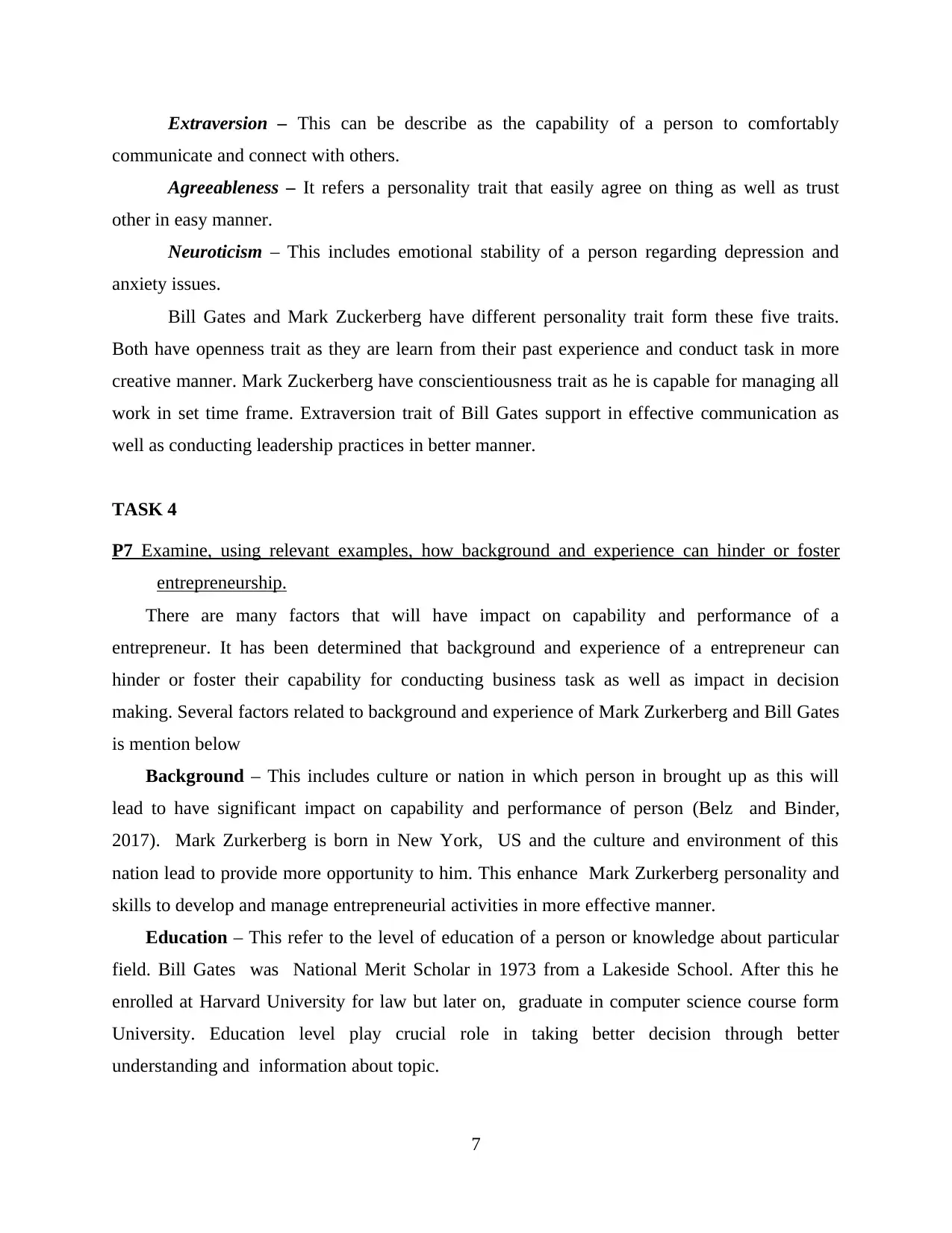
Extraversion – This can be describe as the capability of a person to comfortably
communicate and connect with others.
Agreeableness – It refers a personality trait that easily agree on thing as well as trust
other in easy manner.
Neuroticism – This includes emotional stability of a person regarding depression and
anxiety issues.
Bill Gates and Mark Zuckerberg have different personality trait form these five traits.
Both have openness trait as they are learn from their past experience and conduct task in more
creative manner. Mark Zuckerberg have conscientiousness trait as he is capable for managing all
work in set time frame. Extraversion trait of Bill Gates support in effective communication as
well as conducting leadership practices in better manner.
TASK 4
P7 Examine, using relevant examples, how background and experience can hinder or foster
entrepreneurship.
There are many factors that will have impact on capability and performance of a
entrepreneur. It has been determined that background and experience of a entrepreneur can
hinder or foster their capability for conducting business task as well as impact in decision
making. Several factors related to background and experience of Mark Zurkerberg and Bill Gates
is mention below
Background – This includes culture or nation in which person in brought up as this will
lead to have significant impact on capability and performance of person (Belz and Binder,
2017). Mark Zurkerberg is born in New York, US and the culture and environment of this
nation lead to provide more opportunity to him. This enhance Mark Zurkerberg personality and
skills to develop and manage entrepreneurial activities in more effective manner.
Education – This refer to the level of education of a person or knowledge about particular
field. Bill Gates was National Merit Scholar in 1973 from a Lakeside School. After this he
enrolled at Harvard University for law but later on, graduate in computer science course form
University. Education level play crucial role in taking better decision through better
understanding and information about topic.
7
communicate and connect with others.
Agreeableness – It refers a personality trait that easily agree on thing as well as trust
other in easy manner.
Neuroticism – This includes emotional stability of a person regarding depression and
anxiety issues.
Bill Gates and Mark Zuckerberg have different personality trait form these five traits.
Both have openness trait as they are learn from their past experience and conduct task in more
creative manner. Mark Zuckerberg have conscientiousness trait as he is capable for managing all
work in set time frame. Extraversion trait of Bill Gates support in effective communication as
well as conducting leadership practices in better manner.
TASK 4
P7 Examine, using relevant examples, how background and experience can hinder or foster
entrepreneurship.
There are many factors that will have impact on capability and performance of a
entrepreneur. It has been determined that background and experience of a entrepreneur can
hinder or foster their capability for conducting business task as well as impact in decision
making. Several factors related to background and experience of Mark Zurkerberg and Bill Gates
is mention below
Background – This includes culture or nation in which person in brought up as this will
lead to have significant impact on capability and performance of person (Belz and Binder,
2017). Mark Zurkerberg is born in New York, US and the culture and environment of this
nation lead to provide more opportunity to him. This enhance Mark Zurkerberg personality and
skills to develop and manage entrepreneurial activities in more effective manner.
Education – This refer to the level of education of a person or knowledge about particular
field. Bill Gates was National Merit Scholar in 1973 from a Lakeside School. After this he
enrolled at Harvard University for law but later on, graduate in computer science course form
University. Education level play crucial role in taking better decision through better
understanding and information about topic.
7
Paraphrase This Document
Need a fresh take? Get an instant paraphrase of this document with our AI Paraphraser
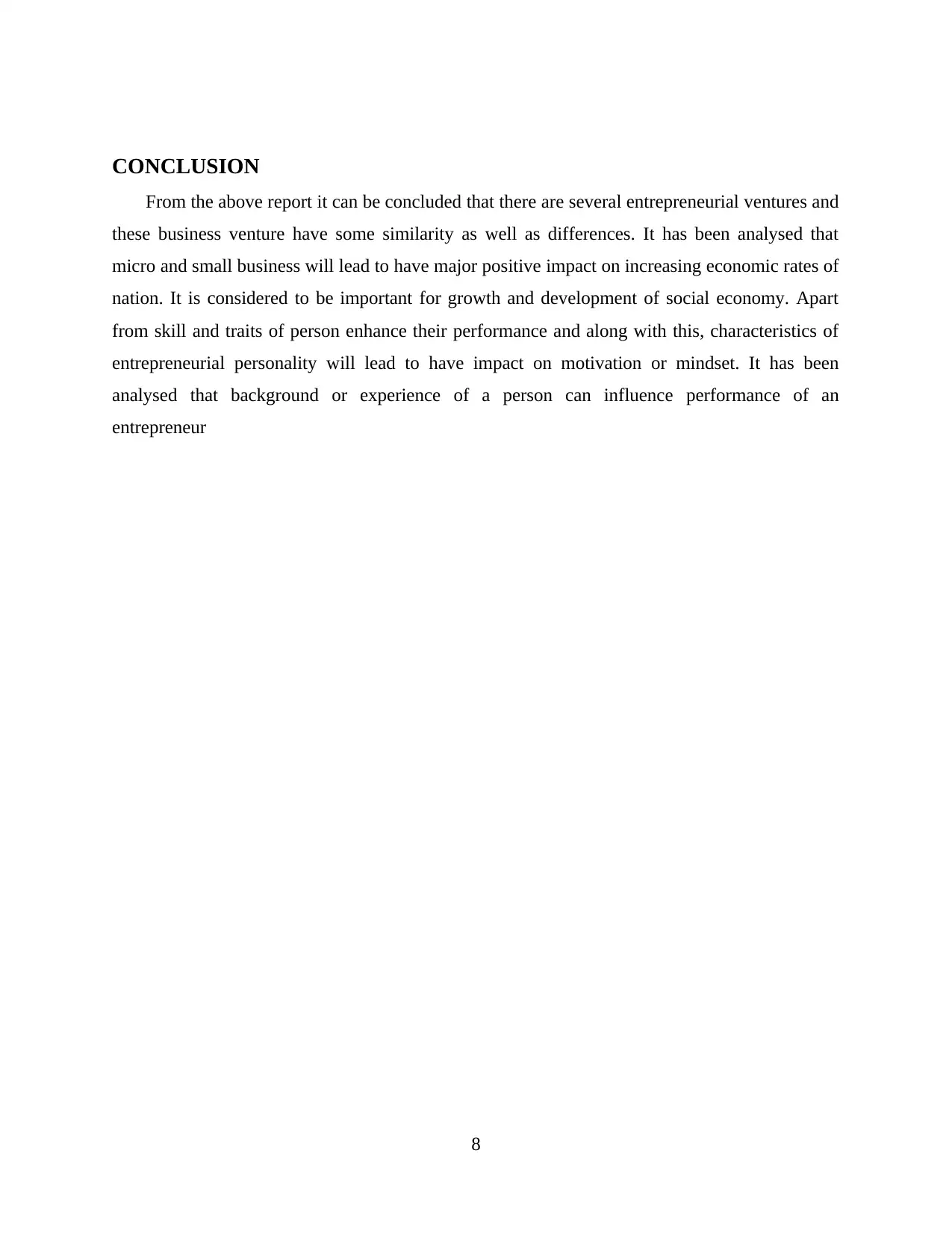
CONCLUSION
From the above report it can be concluded that there are several entrepreneurial ventures and
these business venture have some similarity as well as differences. It has been analysed that
micro and small business will lead to have major positive impact on increasing economic rates of
nation. It is considered to be important for growth and development of social economy. Apart
from skill and traits of person enhance their performance and along with this, characteristics of
entrepreneurial personality will lead to have impact on motivation or mindset. It has been
analysed that background or experience of a person can influence performance of an
entrepreneur
8
From the above report it can be concluded that there are several entrepreneurial ventures and
these business venture have some similarity as well as differences. It has been analysed that
micro and small business will lead to have major positive impact on increasing economic rates of
nation. It is considered to be important for growth and development of social economy. Apart
from skill and traits of person enhance their performance and along with this, characteristics of
entrepreneurial personality will lead to have impact on motivation or mindset. It has been
analysed that background or experience of a person can influence performance of an
entrepreneur
8
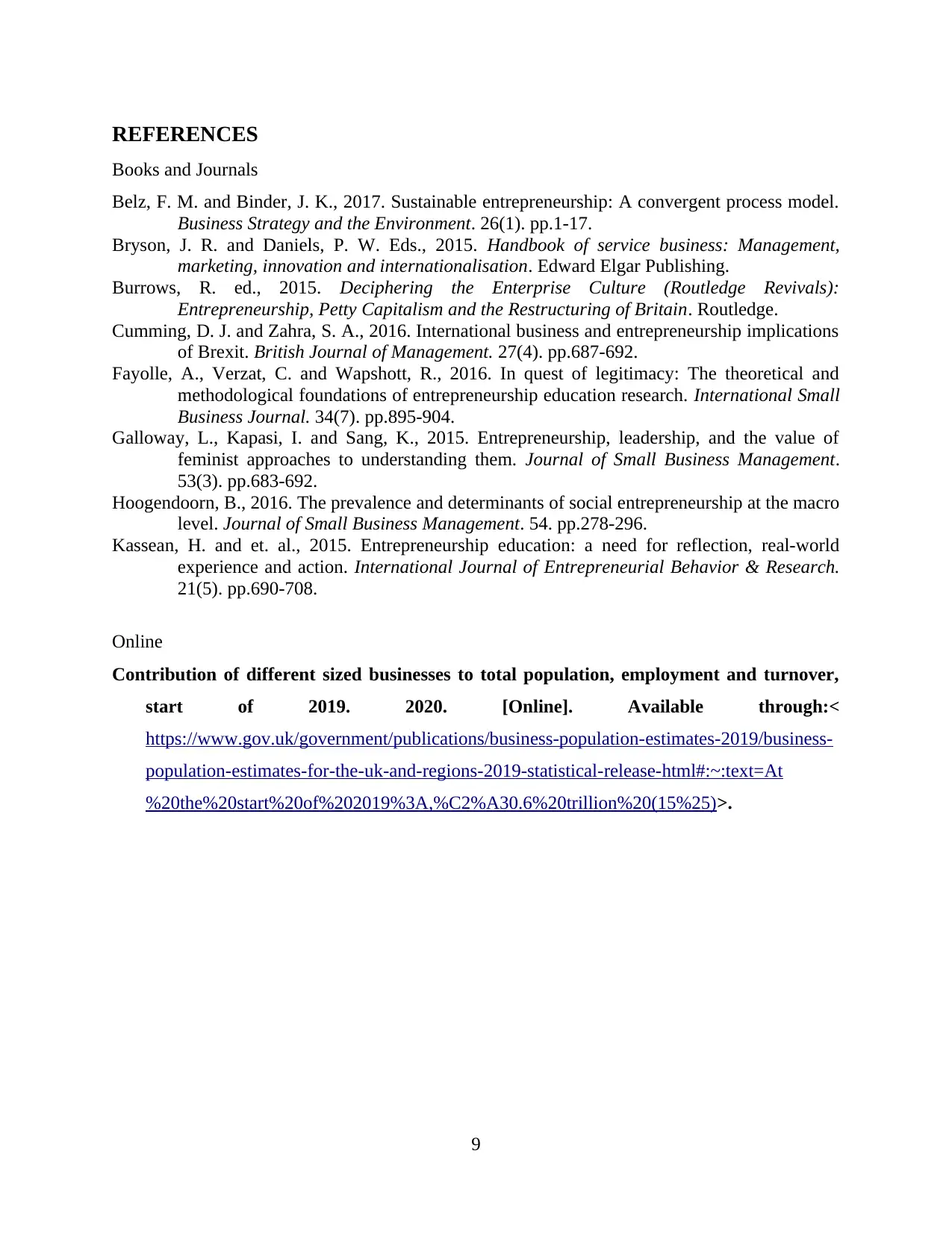
REFERENCES
Books and Journals
Belz, F. M. and Binder, J. K., 2017. Sustainable entrepreneurship: A convergent process model.
Business Strategy and the Environment. 26(1). pp.1-17.
Bryson, J. R. and Daniels, P. W. Eds., 2015. Handbook of service business: Management,
marketing, innovation and internationalisation. Edward Elgar Publishing.
Burrows, R. ed., 2015. Deciphering the Enterprise Culture (Routledge Revivals):
Entrepreneurship, Petty Capitalism and the Restructuring of Britain. Routledge.
Cumming, D. J. and Zahra, S. A., 2016. International business and entrepreneurship implications
of Brexit. British Journal of Management. 27(4). pp.687-692.
Fayolle, A., Verzat, C. and Wapshott, R., 2016. In quest of legitimacy: The theoretical and
methodological foundations of entrepreneurship education research. International Small
Business Journal. 34(7). pp.895-904.
Galloway, L., Kapasi, I. and Sang, K., 2015. Entrepreneurship, leadership, and the value of
feminist approaches to understanding them. Journal of Small Business Management.
53(3). pp.683-692.
Hoogendoorn, B., 2016. The prevalence and determinants of social entrepreneurship at the macro
level. Journal of Small Business Management. 54. pp.278-296.
Kassean, H. and et. al., 2015. Entrepreneurship education: a need for reflection, real-world
experience and action. International Journal of Entrepreneurial Behavior & Research.
21(5). pp.690-708.
Online
Contribution of different sized businesses to total population, employment and turnover,
start of 2019. 2020. [Online]. Available through:<
https://www.gov.uk/government/publications/business-population-estimates-2019/business-
population-estimates-for-the-uk-and-regions-2019-statistical-release-html#:~:text=At
%20the%20start%20of%202019%3A,%C2%A30.6%20trillion%20(15%25)>.
9
Books and Journals
Belz, F. M. and Binder, J. K., 2017. Sustainable entrepreneurship: A convergent process model.
Business Strategy and the Environment. 26(1). pp.1-17.
Bryson, J. R. and Daniels, P. W. Eds., 2015. Handbook of service business: Management,
marketing, innovation and internationalisation. Edward Elgar Publishing.
Burrows, R. ed., 2015. Deciphering the Enterprise Culture (Routledge Revivals):
Entrepreneurship, Petty Capitalism and the Restructuring of Britain. Routledge.
Cumming, D. J. and Zahra, S. A., 2016. International business and entrepreneurship implications
of Brexit. British Journal of Management. 27(4). pp.687-692.
Fayolle, A., Verzat, C. and Wapshott, R., 2016. In quest of legitimacy: The theoretical and
methodological foundations of entrepreneurship education research. International Small
Business Journal. 34(7). pp.895-904.
Galloway, L., Kapasi, I. and Sang, K., 2015. Entrepreneurship, leadership, and the value of
feminist approaches to understanding them. Journal of Small Business Management.
53(3). pp.683-692.
Hoogendoorn, B., 2016. The prevalence and determinants of social entrepreneurship at the macro
level. Journal of Small Business Management. 54. pp.278-296.
Kassean, H. and et. al., 2015. Entrepreneurship education: a need for reflection, real-world
experience and action. International Journal of Entrepreneurial Behavior & Research.
21(5). pp.690-708.
Online
Contribution of different sized businesses to total population, employment and turnover,
start of 2019. 2020. [Online]. Available through:<
https://www.gov.uk/government/publications/business-population-estimates-2019/business-
population-estimates-for-the-uk-and-regions-2019-statistical-release-html#:~:text=At
%20the%20start%20of%202019%3A,%C2%A30.6%20trillion%20(15%25)>.
9
⊘ This is a preview!⊘
Do you want full access?
Subscribe today to unlock all pages.

Trusted by 1+ million students worldwide
1 out of 12
Related Documents
Your All-in-One AI-Powered Toolkit for Academic Success.
+13062052269
info@desklib.com
Available 24*7 on WhatsApp / Email
![[object Object]](/_next/static/media/star-bottom.7253800d.svg)
Unlock your academic potential
Copyright © 2020–2025 A2Z Services. All Rights Reserved. Developed and managed by ZUCOL.



